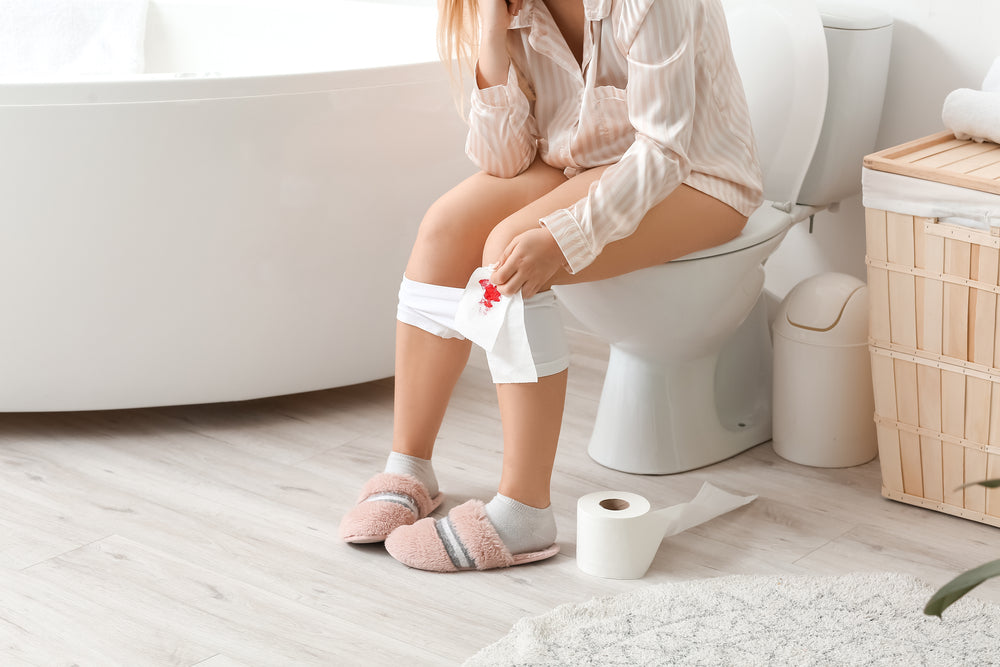You have probably experienced this before: You unsuspectingly go to the toilet and notice that you have been bleeding. You probably wondered how that could be - after all, you shouldn't have had your period yet. In this case, however, it is not your menstruation, but a so-called Spotting However, this is nothing unusual; many women have to deal with it and there is no reason to worry! The causes of spotting can be very different. In this blog post we will explain to you what reasons there are for Intermenstrual bleeding and how you can best deal with this 'surprise'.
Spotting - what is it?
For the sake of clarity, we first want to explain to you the difference between spotting and intermenstrual bleeding. And it is quite simple; the term Intermenstrual bleeding refers to any bleeding that occurs independently of the woman’s menstruation. Spotting However, it is only the external appearance of the bleeding. You can recognize spotting by its color and consistency, as these are usually different from your period. It is usually a brownish discharge, which is also usually less heavy than your menstrual bleeding. This intermenstrual bleeding also occurs quite unexpectedly. How long the intermenstrual bleeding lasts and how heavy it is varies from person to person.
Find the right Taynie for you. Discover our variety!
Identify the reason for the spotting
The causes of spotting vary from person to person. Often the reason for the spotting is obvious: Have you had a lot of stress , or have excessive sport operated, this may already have triggered spotting.
In general, three causes of intermenstrual bleeding are distinguished: organic causes, hormonal causes and mechanical causes.
Spotting: Organic causes
If the spotting is due to organic causes, it can indicate various diseases. For example, it can be caused by Diseases in the intimate area , one Liver disease or by Thyroid problems be triggered.
From a gynecological point of view, spotting can also be associated with cyst formation, inflammation of the ovaries or Endometriosis In this case, however, the bleeding is often accompanied by pain and should be examined by a specialist immediately.
If you want to know more about the topic Endometriosis If you want to know more, please take a look at our Blog post to do so!
Spotting due to hormones
Hormonally-induced spotting is not uncommon: a woman’s hormones are very often the trigger for spotting.
A hormonal imbalance For example, during or after pregnancy, during menopause or during puberty, this can be the reason why you are surprised by spotting. However, this imbalance usually regulates itself.
Within the cycle, for example, it can be caused by a Corpus luteum deficiency or within the ovulation phase, i.e. during ovulation , intermenstrual bleeding may occur.
The reason for this ovulation bleeding is the Decrease in estrogen levels .
A connection between spotting and menstruation can often be established. If the spotting is linked to menstruation and occurs two to three
This also applies to Spotting before your period. This is a so-called pre-bleeding, which lasts two to three
If the Intermenstrual bleeding despite Taking the pill This is completely normal, especially when you first start taking the contraceptive. After all, your body needs to get used to the hormonal changes.
If you forget to take the pill, take it too late or take additional medication, this may prevent the hormones from being absorbed. The result is often intermenstrual bleeding.
If you experience spotting before the one-week break while taking the pill regularly, this may be an indication that the pill dosage is incorrect.
You should also consult your gynecologist if other symptoms (e.g. fever, pain, itching) occur in addition to the bleeding.
Intermenstrual bleeding can also indicate a possible pregnancy despite taking the pill.
Spotting during pregnancy
Pregnancy can generally be associated with spotting. Especially at the beginning of pregnancy, spotting can generally be classified as harmless. For example, during the implantation of the fertilized egg, possible damage to the vessels can cause spotting for seven to twelve
If spotting persists for a long time during an already confirmed pregnancy, an ultrasound examination should be performed to rule out a malformation of the embryo or an incorrect position of the placenta.
If the spotting occurs in conjunction with abdominal pain, discomfort, etc., this may indicate premature detachment of the placenta or the start of labor. Here too, if you experience frequent intermenstrual bleeding and pain, you should have this checked out by your doctor.
Mechanical causes of intermenstrual bleeding
But it is not only the hormones and organs of the woman that can cause brownish discharge and thus intermenstrual bleeding. No, the cause can also lie somewhere else entirely; namely, in external influences. For example, the vessels of the uterine or vaginal mucosa can be irritated when the IUD is inserted or during sexual intercourse. This can then trigger a one-off spotting, which is therefore of mechanical origin.
Safely through spotting with Taynie
In order to bridge the time of intermenstrual bleeding as best as possible and still feel completely comfortable, we recommend that you use our period underwear or washable pads .
In our Daily Collection you will find period underwear with a light absorbency - perfect for intermenstrual bleeding. Here you can choose between different colors and shapes - from Daily String up to the DailyQueen .
Our period panties are free of biocides and help you keep your skin dry despite unexpected bleeding. This means you can get through the spotting safely and without worry.



